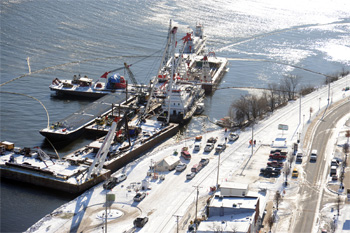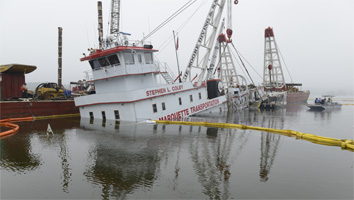A towboat sank in the Mississippi River after striking a rock, prompting a weeks-long salvage and spill response that was hampered by icy conditions.
Stephen L. Colby sank near LeClaire, Iowa, on the afternoon of Nov. 25, 2013. The U.S. Coast Guard is investigating the incident, which occurred after the 154-foot towboat sustained three holes to its hull.
“I can confirm that the Stephen L. Colby struck a rock in late November,” said Lt. Kody Stitz of the Coast Guard Marine Safety Detachment in Rock Island, Ill. “But we can’t say anything further about the cause of the incident while it’s under investigation.”
The vessel, owned by Marquette Transportation of Paducah, Ky., sank with nearly 100,000 gallons of oil on board. The river was closed for more than 24 hours as crews rushed to contain the oil.
Salvage plans began as soon as the vessel sank, said Coast Guard spokesman Lt. Colin Fogarty in St. Louis. But it took more than two weeks to lift the boat, and the fuel cleanup was even longer.
 |
| Photo courtesy U.S. Coast Guard |
| A fleet of salvage vessels and cranes lifts the vessel out of the river a week after that. |
“The salvage involved between 50 to 65 people from government and private entities, with their numbers depending on the day and the stage in the recovery,” Fogarty said.
In addition to salvage activities, the incident required pollution response and a final cleanup. Pollution response was the most labor-intensive phase, Fogarty said.
Also responding were the Iowa Department of Natural Resources, U.S. Department of Fish and Wildlife, Illinois Environmental Protection Agency and the LeClaire fire and police departments.
“Marquette Transportation brought its own experts and utilized OSROs, or oil spill recovery organizations, and salvage crews,” Fogarty said.
Okie Moore Diving & Salvage Co., headquartered in Missouri, and Illinois-based nonprofit Living Lands & Waters provided assistance.
Marquette Transportation didn’t respond to requests for comment.
Marquette “absolutely and without any hesitation completely stepped up and did everything in their power to resolve the situation,” the LeClaire Fire Rescue Department said on its Facebook page.
Weather deteriorated during the recovery, with temperatures dropping below freezing, snow falling and ice forming along the river.
“We used three A-frames in the vessel’s salvage and three tugs and various barges in other operations, including ice deflection, oil recovery, striking operations and harbor patrols,” Fogarty said. “Oil was collected by striking it directly from the tanks. Oil that discharged into the river was controlled with containment and sorbent boom and collected using several types of skimmers and absorbent pads.”
About 89,000 gallons of oily-water mixture was recovered from the vessel, 39,900 gallons of oily water was pulled from the river and more than 6,800 cubic feet of oily waste was gathered. “It took 20 days to collect the oil, with much of the remnants stuck to rip-rap and frozen in the soil,” Fogarty said.
This spring, the Coast Guard expects to return to the area as it thaws to collect remaining oil and restore the surrounding environment.
In December, Stephen L. Colby was towed to a dry dock facility in Wood River, Ill., north of St. Louis, for repairs.

